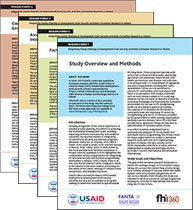 The USAID Multi-Sectoral Nutrition Strategy 2014–2025 prioritized family planning as an intervention that can address underlying causes of malnutrition. In Malawi, FANTA collaborated with the USAID Office of Food for Peace (FFP) and Project Concern International on qualitative formative research to help the Njira development food security activity (DFSA) explore ways to integrate family planning into its nutrition and food security programming. The study was also conducted as a proof of concept to generate broader learning on opportunities for FP integration in DFSAs.
The USAID Multi-Sectoral Nutrition Strategy 2014–2025 prioritized family planning as an intervention that can address underlying causes of malnutrition. In Malawi, FANTA collaborated with the USAID Office of Food for Peace (FFP) and Project Concern International on qualitative formative research to help the Njira development food security activity (DFSA) explore ways to integrate family planning into its nutrition and food security programming. The study was also conducted as a proof of concept to generate broader learning on opportunities for FP integration in DFSAs.
The study investigated the demand and supply side barriers to accessing family planning that women with young children, adolescent girls and young women face. Employing a user-centered design, the research explored how Njira can create acceptable and feasible linkages—tailored to the needs of these priority target groups—from its project platforms to government family planning services. The study also explored community perspectives on connections between population growth, family planning, health, and food security to leverage the project’s health and non-health platforms in promoting social acceptability of family planning use.
Key findings from the research are reported on in four briefs. The first brief provides an overview of the research. Briefs two, three, and four discuss, respectively, demand side factors affecting family planning use; community perceptions of current family planning services and feedback on the two proposed FP integration activities; and community perspectives on the connections between population growth, family planning, health, and food security.


